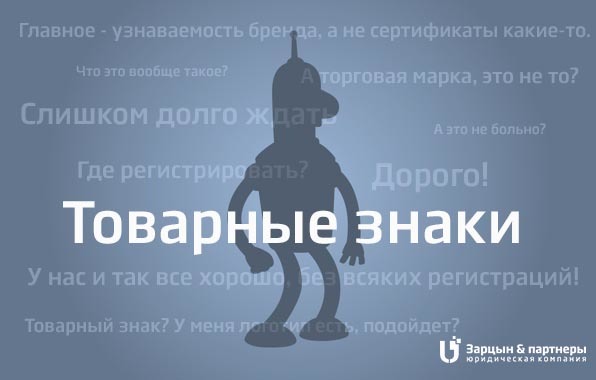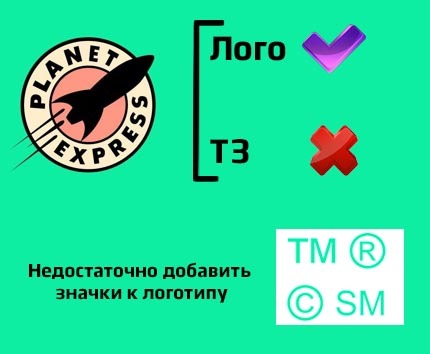How to distinguish a trademark from a trademark
Feedback is great. You write an article about one thing, and in the comments you are immediately asked to tell about the other and the third. Such a thing happened with trademarks.
This topic is tightly intertwined with several areas of our life and work: design, advertising and jurisprudence. The latter, perhaps, is completely intertwined with any subject, only not everyone thinks about it. We will consider the trademark (logo, brand, trademark) with its own, legal bell tower.

Who is
Let us immediately define, the Russian legislation does not know such terms as a trademark, logo or brand. For the Law, there is only a trademark - a designation that serves to individualize the goods of legal entities or individual entrepreneurs.
From this definition it follows that a trademark may belong only to individual entrepreneurs and legal entities. Individuals may not have trademark rights.
')
There is some difference between the fact that you have a logo and the fact that you have a trademark.
The trademark is subject to mandatory registration in Rospatent. And only after receiving the certificate you have the right to it.
A logo is an object of copyright (which arises from the author without any registration from the moment of creation), and only if you have an agreement with the author on the transfer of exclusive rights, do you own the rights to this logo.
For example, you have an insanely beautiful logo and all rights to it are obtained, it is placed on your website, business cards and letterheads. But this is not a trademark. But if you registered this logo with Rospatent, then you already have a trademark.

Three types are most common:
These are, so to speak, traditional types of trademarks that are constantly used and registered.
But there are more exotic (less common):
Example of a combined logo:

Of course, you cannot register anything. There are certain restrictions due to which you may be denied registration of TK, for example:
1. The TK is the same or confusingly similar to an already registered trademark.
For example, if you want to register a trademark, say, “Deti” written in Latin letters, then you will not be able to do this if there is already a registered trademark “Children”, written in Cyrillic. In this case, most likely, Rospatent will fail, establishing the so-called degree of confusion, that is, the homogeneity of these trademarks.
2. TK does not have a distinctive ability or consists only of the elements:
- included in the universal use for the designation of goods of a certain type;
- which are generally accepted symbols and terms;
- characterizing goods, including those indicating their type, quality, quantity, property, purpose, value, as well as the time, place and method of their production or sale;
- representing a form of goods, which is determined solely or mainly by the property or purpose of the goods.
For example, the courier service cannot be registered for a courier company. Also, as a rule, numbers cannot be registered if they do not have any special way of writing or combination.
Or, for example, Rospatent refused to register the trademark “Auto Rou”, because it considered that the word “auto” is a generally accepted abbreviation for goods related to automobiles.
3. It consists only of elements that constitute: state emblems, flags and other state symbols and signs; abbreviated or full names of international and intergovernmental organizations, their coats of arms, flags, other symbols and signs.
For example, the UN, UNESCO, the International Olympic Committee, the World Health Organization, WIPO, etc. These elements may be contained in a trademark solely as unprotected elements and only if the relevant competent authority or their owners have the consent.
4. Violates generally accepted world standards, moral, national traditions and cultures.
For example, a dispute was considered in court when Rospatent refused to register the Tikhiy Don trademark in relation to alcoholic beverages. Representatives of Rospatent considered that the work of Sholokhov was a national treasure, and registering it as a mark in relation to alcoholic products could violate ethics, morality, and this is the most national treasure.
Nevertheless, the applicant was able to prove in court that “The Quiet Don”, of course, is a great work, but the registration of a trademark in relation to an alcoholic product does not in any way violate the moral standards. At the same time, of course, the moment of determination, violates one or another trademark of the norms of morality, ethics, is a value judgment of both the experts of Rospatent and the judges, if the case goes to court.
5. Trademarks may contain so-called special objects that require more attention, such as surnames . For consulting companies, specifying the name of the founder or managing partners in the title is quite common. However, the name itself can rarely be registered as a trademark.
Evaluating the possibility of such registration, Rospatent assumes that legal protection should be provided only if the name at the time of application has already had a certain distinctive feature for the consumer. If you prove that the consumer associates this surname with your goods and services, and not just with the surnames, then, most likely, legal protection will be provided to such a trademark.
However, Rospatent will analyze the following: is not the name in Russian and a foreign language identical to some generally accepted symbol or term, and is the designation of the reproducing last name a property of the culture and history of the Russian Federation? For example, the names of Dostoevsky, Pushkin, can hardly be registered as a trademark.
6. Another special object is geographical names , which, as a general rule, cannot be registered as a trademark. In this case, geographic names should be distinguished by common concepts related to geography, such as the ocean, the pole, the equator, and so on. With respect to them, the ban on registration does not exist.
In addition, when registering a geographical concept, there are some subtleties. For example, as a trademark, the name of a locality, settlement, which is little known or absent on maps can be registered.
We can recall the example of the Gzhel trademark, which was registered as a trademark for alcoholic beverages, and subsequently the registration of a trademark was disputed. However, the court decided that the name "Gzhel" at the time of challenging among consumers was already tightly associated with alcoholic beverages. However, since the town of Gzhel is little known, the legal protection of the trademark was retained.
Accordingly, when checking the application, Rospatent will analyze how well your brand is known and how well known is the town whose name it bears.
If you decide to register a trademark in Russia, then you should know: registration is performed by Rospatent. But get ready in advance, because this process is quite long and takes 12-15 months (although the law does not specify any deadlines, in practice this happens very rarely faster).

But the long-awaited step-by-step instruction:
1. The choice of classes MKTU.
The international classification of goods and services for the registration of marks is a kind of directory with the division into types of goods and services. Before registering TK, you must choose which classes you want to protect.
You can see the list of classes and select suitable ones here www.mktu.info .
When choosing, it is worth remembering that registration of similar TK in different classes is allowed. Therefore, it makes sense to choose several classes of ICGS in order to maximally protect oneself from the attacks of competitors.
2. Preliminary check.
It should be checked through the Rospatent database whether there are already registered similar (similar to yours) trademarks and whether there are any applications for registration of such marks.
There is an open database of already registered trademarks on the Rospatent website, but since the applications submitted are not included there, a significant error is obtained. Indeed, the protection of TK begins from the moment of filing the application And if you submit the second application, then obviously you will not have priority.
The verification can be entrusted to an attorney or done independently, by submitting an application to Rospatent and paying a fee. It will take you about a month - moments against the background of the total registration duration, isn't it?
3. Application
According to the requirements of Article 1492 of the Civil Code of the Russian Federation, an application for a trademark must contain:
The form itself is strictly regulated by the department, so the leaflet, written in free form by hand, will not roll. Also attached to the application document on the payment of state duty. To calculate what its size will be, you can use the calculator on the Rospatent website www1.fips.ru/wps/wcm/connect/content_ru/ru/poshl_s/k_p .
After filing the application, Rospatent carries out work on its verification, which includes:
If during the consideration of the application, Rospatent finds any omissions or concludes that the trademark cannot be registered, it will notify the applicant and give time to distribute and provide his point of view.
It is worth remembering that the registration of a trademark not only helps to protect your business in a competitive struggle, but also increases the attractiveness for investors.
The term of registration of a trademark is not eternal - only 10 years. The term of protection of TZ can be extended, and it can still be terminated early. This can be done only in court. Therefore, carefully monitor how you use your trademark and whether the term of its protection has not expired.
This topic is tightly intertwined with several areas of our life and work: design, advertising and jurisprudence. The latter, perhaps, is completely intertwined with any subject, only not everyone thinks about it. We will consider the trademark (logo, brand, trademark) with its own, legal bell tower.

Who is mr. Putin is a trademark?
Let us immediately define, the Russian legislation does not know such terms as a trademark, logo or brand. For the Law, there is only a trademark - a designation that serves to individualize the goods of legal entities or individual entrepreneurs.
From this definition it follows that a trademark may belong only to individual entrepreneurs and legal entities. Individuals may not have trademark rights.
')
I have a logo - is it a trademark?
There is some difference between the fact that you have a logo and the fact that you have a trademark.
The trademark is subject to mandatory registration in Rospatent. And only after receiving the certificate you have the right to it.
A logo is an object of copyright (which arises from the author without any registration from the moment of creation), and only if you have an agreement with the author on the transfer of exclusive rights, do you own the rights to this logo.
For example, you have an insanely beautiful logo and all rights to it are obtained, it is placed on your website, business cards and letterheads. But this is not a trademark. But if you registered this logo with Rospatent, then you already have a trademark.

What trademarks are there?
Three types are most common:
- Verbal (for example, Johnson & Johnson).
- Fine (for example, the well-known apple)
- Combined: word + picture
These are, so to speak, traditional types of trademarks that are constantly used and registered.
But there are more exotic (less common):
- Bulky (for example, Coca-cola bottle shape).
- Sonic (flick Zippo lighters).
- Olfactory and taste.
Example of a combined logo:

What can not register?
Of course, you cannot register anything. There are certain restrictions due to which you may be denied registration of TK, for example:
1. The TK is the same or confusingly similar to an already registered trademark.
For example, if you want to register a trademark, say, “Deti” written in Latin letters, then you will not be able to do this if there is already a registered trademark “Children”, written in Cyrillic. In this case, most likely, Rospatent will fail, establishing the so-called degree of confusion, that is, the homogeneity of these trademarks.
2. TK does not have a distinctive ability or consists only of the elements:
- included in the universal use for the designation of goods of a certain type;
- which are generally accepted symbols and terms;
- characterizing goods, including those indicating their type, quality, quantity, property, purpose, value, as well as the time, place and method of their production or sale;
- representing a form of goods, which is determined solely or mainly by the property or purpose of the goods.
For example, the courier service cannot be registered for a courier company. Also, as a rule, numbers cannot be registered if they do not have any special way of writing or combination.
Or, for example, Rospatent refused to register the trademark “Auto Rou”, because it considered that the word “auto” is a generally accepted abbreviation for goods related to automobiles.
3. It consists only of elements that constitute: state emblems, flags and other state symbols and signs; abbreviated or full names of international and intergovernmental organizations, their coats of arms, flags, other symbols and signs.
For example, the UN, UNESCO, the International Olympic Committee, the World Health Organization, WIPO, etc. These elements may be contained in a trademark solely as unprotected elements and only if the relevant competent authority or their owners have the consent.
4. Violates generally accepted world standards, moral, national traditions and cultures.
For example, a dispute was considered in court when Rospatent refused to register the Tikhiy Don trademark in relation to alcoholic beverages. Representatives of Rospatent considered that the work of Sholokhov was a national treasure, and registering it as a mark in relation to alcoholic products could violate ethics, morality, and this is the most national treasure.
Nevertheless, the applicant was able to prove in court that “The Quiet Don”, of course, is a great work, but the registration of a trademark in relation to an alcoholic product does not in any way violate the moral standards. At the same time, of course, the moment of determination, violates one or another trademark of the norms of morality, ethics, is a value judgment of both the experts of Rospatent and the judges, if the case goes to court.
5. Trademarks may contain so-called special objects that require more attention, such as surnames . For consulting companies, specifying the name of the founder or managing partners in the title is quite common. However, the name itself can rarely be registered as a trademark.
Evaluating the possibility of such registration, Rospatent assumes that legal protection should be provided only if the name at the time of application has already had a certain distinctive feature for the consumer. If you prove that the consumer associates this surname with your goods and services, and not just with the surnames, then, most likely, legal protection will be provided to such a trademark.
However, Rospatent will analyze the following: is not the name in Russian and a foreign language identical to some generally accepted symbol or term, and is the designation of the reproducing last name a property of the culture and history of the Russian Federation? For example, the names of Dostoevsky, Pushkin, can hardly be registered as a trademark.
6. Another special object is geographical names , which, as a general rule, cannot be registered as a trademark. In this case, geographic names should be distinguished by common concepts related to geography, such as the ocean, the pole, the equator, and so on. With respect to them, the ban on registration does not exist.
In addition, when registering a geographical concept, there are some subtleties. For example, as a trademark, the name of a locality, settlement, which is little known or absent on maps can be registered.
We can recall the example of the Gzhel trademark, which was registered as a trademark for alcoholic beverages, and subsequently the registration of a trademark was disputed. However, the court decided that the name "Gzhel" at the time of challenging among consumers was already tightly associated with alcoholic beverages. However, since the town of Gzhel is little known, the legal protection of the trademark was retained.
Accordingly, when checking the application, Rospatent will analyze how well your brand is known and how well known is the town whose name it bears.
Where to run, where to register?
If you decide to register a trademark in Russia, then you should know: registration is performed by Rospatent. But get ready in advance, because this process is quite long and takes 12-15 months (although the law does not specify any deadlines, in practice this happens very rarely faster).

But the long-awaited step-by-step instruction:
1. The choice of classes MKTU.
The international classification of goods and services for the registration of marks is a kind of directory with the division into types of goods and services. Before registering TK, you must choose which classes you want to protect.
You can see the list of classes and select suitable ones here www.mktu.info .
When choosing, it is worth remembering that registration of similar TK in different classes is allowed. Therefore, it makes sense to choose several classes of ICGS in order to maximally protect oneself from the attacks of competitors.
2. Preliminary check.
It should be checked through the Rospatent database whether there are already registered similar (similar to yours) trademarks and whether there are any applications for registration of such marks.
There is an open database of already registered trademarks on the Rospatent website, but since the applications submitted are not included there, a significant error is obtained. Indeed, the protection of TK begins from the moment of filing the application And if you submit the second application, then obviously you will not have priority.
The verification can be entrusted to an attorney or done independently, by submitting an application to Rospatent and paying a fee. It will take you about a month - moments against the background of the total registration duration, isn't it?
3. Application
According to the requirements of Article 1492 of the Civil Code of the Russian Federation, an application for a trademark must contain:
- an application for state registration of the designation as a trademark, indicating the applicant, as well as his place of residence or location;
- the claimed designation (the actual picture of your logo or what you have there);
- the list of goods and / or services in respect of which the state registration of a trademark is requested and which are grouped into classes of ICGS;
- description of the proposed designation (detailed verbal description of your logo).
The form itself is strictly regulated by the department, so the leaflet, written in free form by hand, will not roll. Also attached to the application document on the payment of state duty. To calculate what its size will be, you can use the calculator on the Rospatent website www1.fips.ru/wps/wcm/connect/content_ru/ru/poshl_s/k_p .
After filing the application, Rospatent carries out work on its verification, which includes:
- acceptance and registration of the application;
- publication in the official bulletin of Rospatent (hereinafter referred to as the official bulletin) of information on submitted applications;
- verification of payment of fees and formal examination of the application;
- examination of the designation claimed as a trademark (hereinafter - the examination of the claimed designation);
- consideration of applications and petitions submitted by the applicant on his own initiative;
- and, finally, the final - registration of a trademark in the State Register, publication of information on the state registration of a trademark and issuance of a certificate for a trademark.
If during the consideration of the application, Rospatent finds any omissions or concludes that the trademark cannot be registered, it will notify the applicant and give time to distribute and provide his point of view.
It is worth remembering that the registration of a trademark not only helps to protect your business in a competitive struggle, but also increases the attractiveness for investors.
The term of registration of a trademark is not eternal - only 10 years. The term of protection of TZ can be extended, and it can still be terminated early. This can be done only in court. Therefore, carefully monitor how you use your trademark and whether the term of its protection has not expired.
Source: https://habr.com/ru/post/303546/
All Articles